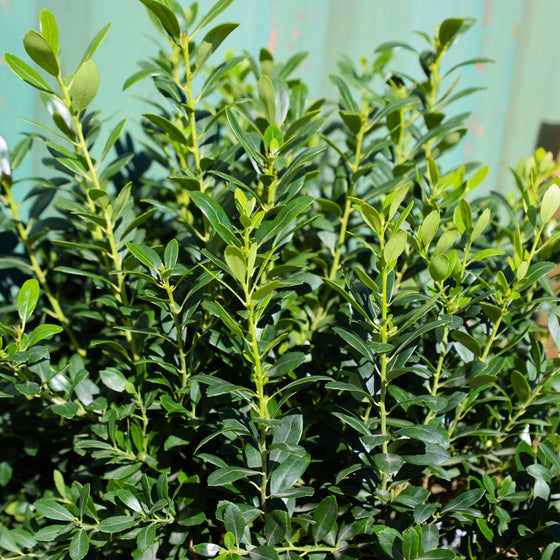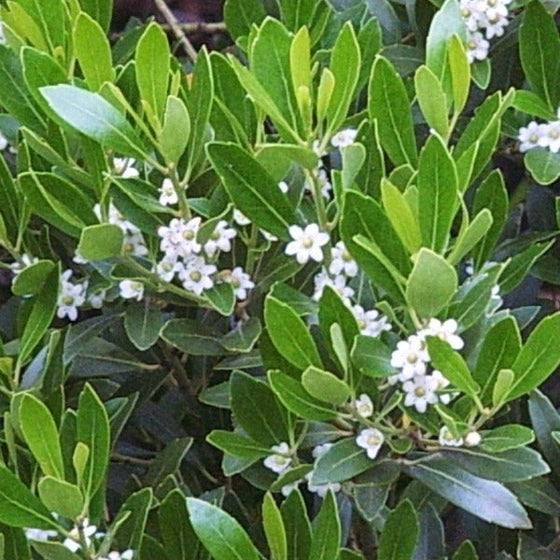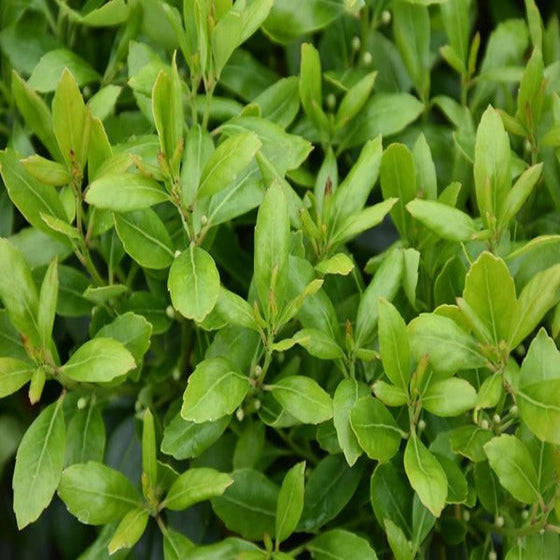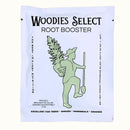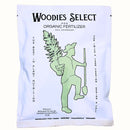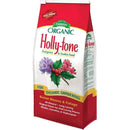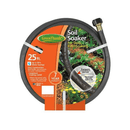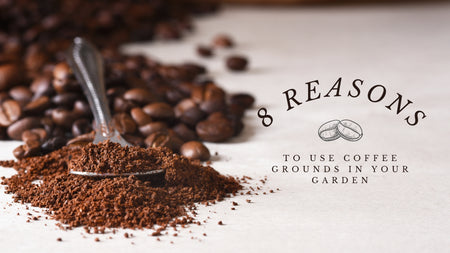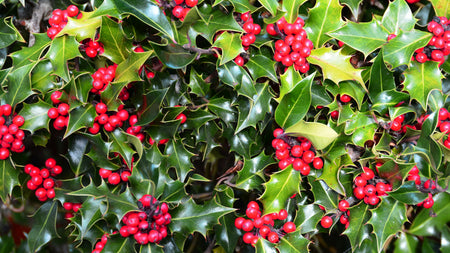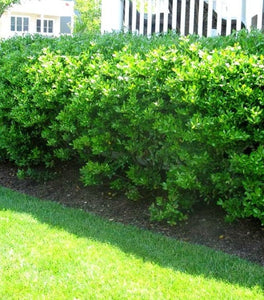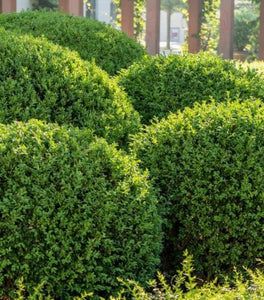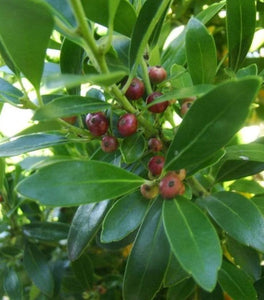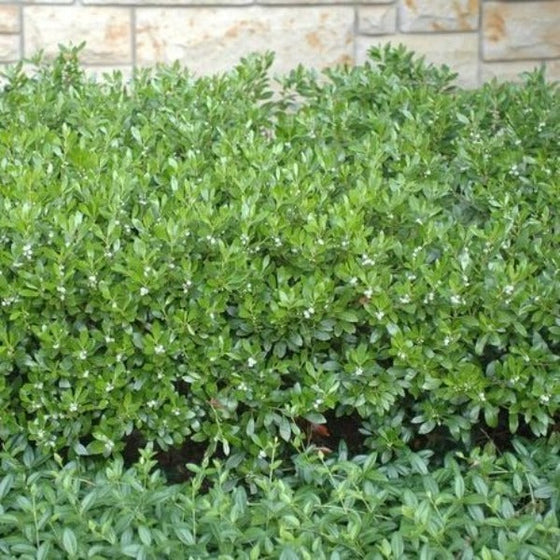
Images Depict Mature Plants
Buy Densa Inkberry Holly Shrubs Online
Densa Inkberry Holly (Ilex glabra 'Densa') is an attractive evergreen shrub known for its dense, bushy growth habit and glossy, dark green foliage. With a mature height of 3 to 4 feet and a spread of 4 to 6 feet, Densa Inkberry Holly is an excellent choice for low hedges, foundation plantings, or a lush backdrop for mixed borders. The small, fine-textured leaves resemble boxwoods, providing a similar formal look while being more adaptable and disease-resistant. This shrub's compact and rounded growth makes it ideal for creating a year-round garden structure, adding privacy and visual interest.
Densa Inkberry Holly thrives in USDA zones 4-9 and adapts well to both full sun and partial shade. It prefers well-drained, slightly acidic soil and is highly tolerant of various soil types, from sandy to clay-rich soils. This adaptability makes Densa Inkberry Holly an excellent choice for various landscape conditions, including areas that experience occasional flooding. The shrub produces small, white flowers in late spring, which attract pollinators, followed by dark berries in fall that provide an essential food source for birds. These features add seasonal interest and promote local biodiversity, making this plant both beautiful and beneficial to the environment.
In addition to its lush appearance, Densa Inkberry Holly is deer-resistant, making it an ideal option for gardens where deer are an issue. This low-maintenance shrub requires minimal pruning to keep its attractive shape, allowing it to provide a neat and orderly presence in any garden setting. Whether used as a hedge, an accent plant, or for mass planting, Densa Inkberry Holly delivers year-round greenery and serves as a reliable, low-maintenance choice for any landscape. Its adaptability, compact form, and resilience to pests and diseases make it a favorite for enhancing garden structure and adding lasting visual appeal.
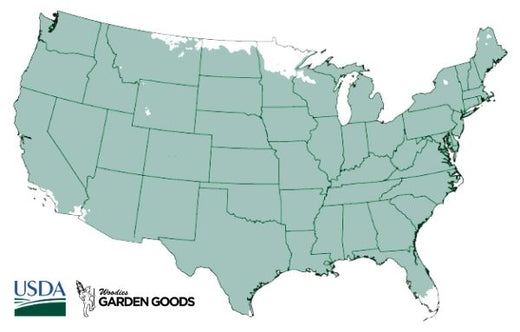
| Hardiness Zone: | 4-9 |
|---|---|
| Mature Height: | 3 to 4 Feet |
| Mature width: | 4 to 6 Feet |
| Classification: | Broad leaved evergreen shrub |
| Sunlight: | Full Sun |
| Habit: | Densely branched, Upright |
| Foliage: | Dark Green |
| Flower Color: | White flowers that produce black berries |
| Pruning Season: | Prune in late spring to maintain shape |
| Soil Condition: | Any well drained soil |
| Water Require: | Water well until established |
| Uses: | Extremely attractive when used as in the mixed border, foundations, or planted in mass. Perfect for use as an evergreen privacy screen |
How to Care for Densa Inkberry Holly
Be sure to read our planting instructions to ensure a healthy and happy Densa Inkberry Holly for years to come!
How Do I Plant A Densa Inkberry Holly?
To plant a Densa Inkberry Holly, begin by selecting a location that receives full sun to partial shade and has well-drained, slightly acidic soil. Dig a hole twice as wide as the root ball and as deep as the root ball to allow ample space for root expansion. Position the shrub in the hole so that the top of the root ball is level with or slightly above the surrounding soil, promoting good drainage and preventing root rot. Backfill the hole with a mixture of native soil and organic compost to improve soil quality and ensure healthy root establishment. After placing the shrub in the hole, water it thoroughly to settle the soil and eliminate any air pockets. Applying a 2- to 3-inch layer of mulch around the base of the shrub helps retain moisture and maintain even soil temperatures, but be sure to keep the mulch a few inches away from the trunk to prevent rot. When planting multiple Densa Inkberry Hollies for a hedge or border, space the shrubs about 3 to 4 feet apart, measuring from the center of each plant. This spacing allows the shrubs to grow together, forming a dense and attractive hedge while still providing adequate airflow to reduce the risk of disease. Consistent watering is crucial during the first growing season to help establish a strong root system. Deeply water the shrubs once a week, ensuring that the soil remains consistently moist but not waterlogged. Once established, Densa Inkberry Holly is relatively low-maintenance and can tolerate occasional dry spells, making it an ideal choice for creating a beautiful and resilient evergreen structure in your landscape.
How Do I Water A Densa Inkberry Holly?
To properly water a Densa Inkberry Holly, focus on deep and consistent watering, especially during the first year after planting to help establish a healthy root system. Water the shrub deeply once a week, ensuring that the soil is moistened to a depth of about 6 to 8 inches to promote strong root development and drought tolerance. During particularly hot or dry weather, increase the watering frequency to prevent the soil from drying out completely, as Densa Inkberry Holly prefers consistently moist soil. Be sure to water at the base of the shrub rather than overhead, as excess moisture on the foliage can lead to fungal diseases. Adding a 2- to 3-inch layer of mulch around the base of the shrub helps to retain soil moisture, regulate temperature, and reduce the need for frequent watering. Once established, Densa Inkberry Holly becomes more tolerant of occasional dry periods and requires less frequent watering. However, during prolonged dry spells or periods of high heat, supplemental deep watering every 10 to 14 days will help maintain the lush, dense foliage that makes Densa Inkberry Holly such an attractive addition to the landscape. It is important to regularly check the soil moisture by digging a few inches down—if the soil feels dry to the touch, it’s time to water. Avoid overwatering, as soggy soil can lead to root rot, which can compromise the health of the plant. By following these watering guidelines, you can ensure that your Densa Inkberry Holly remains healthy, lush, and vibrant throughout the year.
How Do I Fertilize A Densa Inkberry Holly?
To fertilize a Densa Inkberry Holly, apply a balanced, slow-release fertilizer in early spring just before new growth begins. A fertilizer with an N-P-K ratio of 10-10-10 is ideal for supporting strong root development, lush foliage, and healthy growth throughout the growing season. Spread the fertilizer evenly around the base of the shrub, ensuring it is kept at least a few inches away from the trunk to avoid root burn. After applying the fertilizer, water the area thoroughly to help the nutrients penetrate the soil and reach the root zone. This initial spring feeding will provide essential nutrients to maintain the dense, attractive appearance of your Densa Inkberry Holly. In addition to spring feeding, Densa Inkberry Holly can benefit from an additional light feeding in mid-summer, particularly if the plant is growing in nutrient-poor soil or showing signs of slowed growth. Applying organic compost or well-rotted manure around the base of the shrub can also be an effective way to improve soil quality and provide a steady release of nutrients throughout the year. Be careful not to over-fertilize, as excessive nutrients can lead to rapid, weak growth that is more susceptible to pests and diseases. With the right fertilization regimen, Densa Inkberry Holly will thrive, maintaining its glossy, evergreen foliage and dense, rounded form, adding year-round beauty and structure to your landscape.

How Do I Prune A Densa Inkberry Holly?
To prune a Densa Inkberry Holly, begin by performing light pruning in late winter or early spring before new growth begins. This timing allows the shrub to recover quickly and encourages healthy, vigorous growth throughout the season. Use clean, sharp pruning shears to remove any dead, damaged, or diseased branches, which will help improve air circulation and reduce the risk of disease. Densa Inkberry Holly has a naturally compact and rounded growth habit, so it requires minimal pruning to maintain its shape. If the shrub has any leggy or wayward branches, trim them back to encourage a fuller, denser appearance, which is ideal for hedges and foundation plantings. Throughout the growing season, you can also perform light trimming as needed to maintain the desired shape of your Densa Inkberry Holly. Avoid heavy pruning in late summer or fall, as this can stimulate new growth that may not harden before winter, making it susceptible to frost damage. When pruning, never remove more than one-third of the plant at a time to avoid stressing the shrub. Regular, light pruning will help maintain the lush, dense foliage and rounded form that make Densa Inkberry Holly an excellent choice for year-round landscape interest. With proper pruning, your Densa Inkberry Holly will continue to thrive, providing a neat, attractive evergreen presence in your garden.

